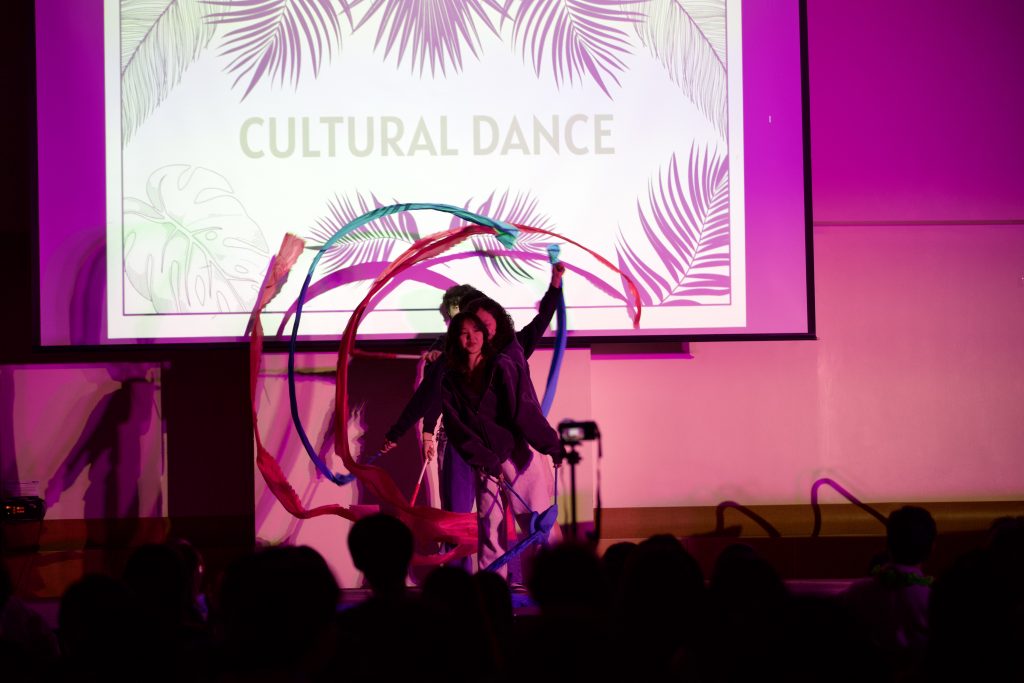The Taiwanese American Student Coalition hosted its annual spring banquet this past weekend, offering students a fun-filled night of food, games, comedy and culture.
In light of this year’s theme, “Formosa Nights,” the Mandela Room was transformed into a tropical paradise with colorful leis hanging from the ceiling and beautiful backdrops of island scenes. The tables were decorated with mason jars with tropical leaves and fairy lights.
Angela Li, TASC’s president and a senior majoring in integrative neuroscience, shared the importance of the annual event.
“It’s one of our big annual events, and it’s basically a celebration of Taiwanese culture,” Li said. “But not only just that, it shows the goofy side of our E-Board. It shows the more fun parts of making sure we’re here to create a warm and welcoming community here on campus, so anyone can join.”
Taiwanese student organizations from universities including Cornell, Rutgers and Stony Brook attended, building connections spanning campuses. According to Zoe Ng, a co-fundraising chair and a sophomore double-majoring in economics and psychology, inviting other groups to partake in the festivities was an important way to spread ideas and spread Taiwanese culture — a common goal of everyone in attendance.
Lively skits created by the TASC E-Board were the highlight of the event. Throughout the night, video performances blended comedy and drama, showcasing TASC’s acting abilities to the crowd. Members acted out comedic commercial-like skits for fake products, like a personal wingman with a bronze, silver and gold package to help you flirt and mints that make you forget embarrassing experiences.
The pinnacle of the skits was a dramatic performance following competitors of a hot dog eating contest who get kidnapped and must figure out a way to escape the island they are stranded on. The actors kept the crowd on the edge of their seats, with exciting plot twists and an enemies-to-lovers plot.
Alongside the skits, attendees could play three games: “flavor roulette,” “grab the cup” and “deflower the cup.” With prizes on the line like a Stussy hoodie and a Smiski lamp, these games encouraged audience members to compete and participate. “Grab the cup” was a unique form of “Simon Says,” and in “deflower the cup,” contestants knocked flowers off cups by blowing a party horn, competing to stack the cups the fastest. In “flavor roulette,” volunteers guessed what ingredients were in their mystery drink, with the risk of drinking unconventional beverages like lemon juice, salt, orange juice and sriracha.
Thai Time, a local restaurant on Binghamton’s Front Street, catered for the banquet, and guests had their pick from spring rolls, rice, noodles, vegetables and other delicious options.
The banquet also featured a variety of live performances, including group dances from TASC’s men, women and the whole E-Board. Charlene Cheng, one of TASC’s freshman representatives majoring in music, performed a live song. Members performed cultural dances with flowing ribbons and colorful fans, followed by a performance by Paradox, a K-pop dance group.
“In general, we try to always pick songs that are new and relevant and that are popular with our [general body],” said Juliana Campopiano, the president of Paradox and a junior majoring in business administration. “So I think we bring performances with songs that the crowd is familiar with, that way they’re excited about the songs that we’re performing, and hopefully we bring a lot of energy to the stage with our dancing.”
Izzy Tai, an events coordinator and a sophomore majoring in integrative neuroscience, described the benefits of joining a cultural organization like TASC.
“Not only does it teach you about obviously the culture of the club that you’re in, but it also brings you closer to other people,” Tai said. “It makes you feel more connected to the campus. Because of these events, you get to interact with other students that you never met before. It brings you out of your comfort zone in a good way, and you really make close friends being in a cultural [organization], because not everyone is Taiwanese in this club, but we all teach each other about our own cultures, and I think it’s very cool to see what differences and similarities we have.”



